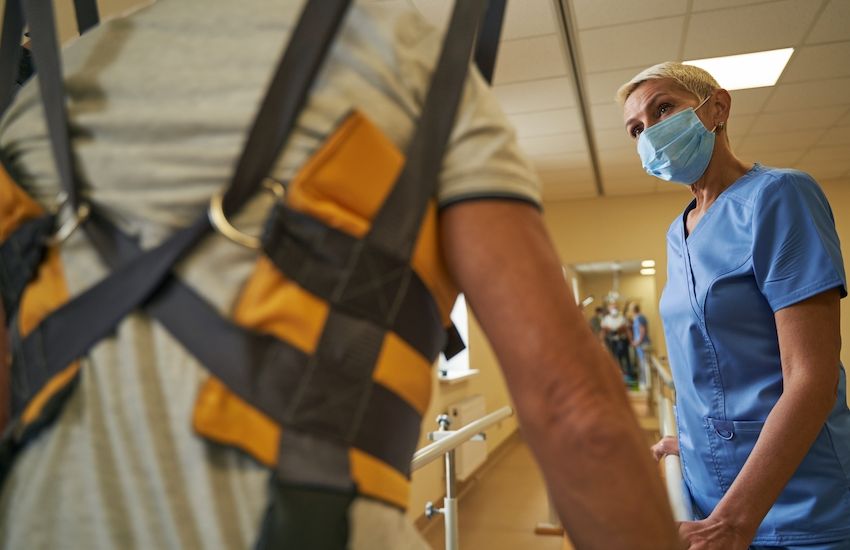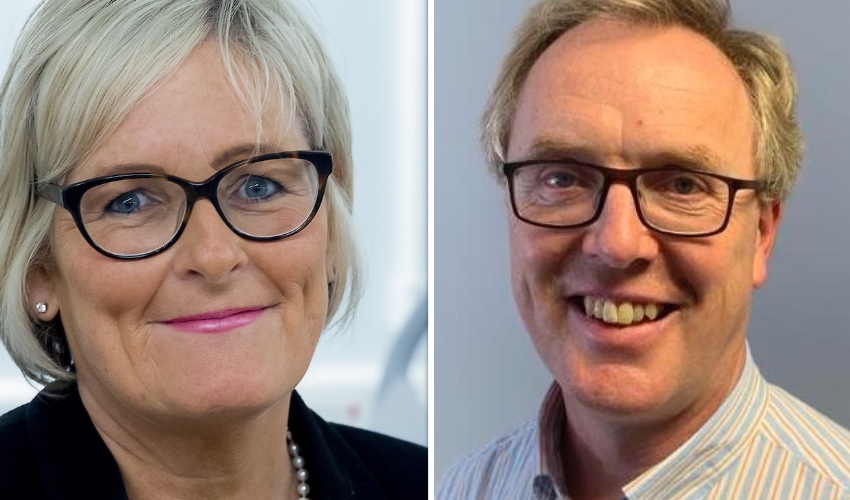


Dear States Members, At the beginning of the pandemic the modelling suggested we could face a situation where we would need to accommodate 3-4 times as many patients as we had beds for, 10-20 times more patients requiring intensive care than we had capacity for and a need to provide oxygen to these patients at a rate that was massively in excess than we could have provided at that point.
The modelling also suggested that we might have had to face the death of 500 islanders in the first wave. Like our colleagues across the world, we had no direct experience to draw on or text-book to turn to in order to respond to this daunting situation.
Some of our responses are well documented such as the building of the Nightingale wing, however it is safe to say that the pandemic has and continues to turn the way we deliver healthcare on its head.
Now nearly two years on we are still affected every day by the pandemic in some form or another whilst we continue to manage and deliver our usual services. During this time, we have continued to develop plans for ‘Our Hospital’ and have started to deliver changes within the remit of the Jersey Care Model.
New services such as Overnight Community Care, HCS24, Help at Home, My mHealth, Night Sitting, Teleguidance, Telecare and many changes to our community therapy services are already beginning to have an impact and we expect other projects to gather pace over the coming year.

Pictured: Letter authors Chief Nurse Rose Naylor and Medical Director Patrick Armstrong.
We are therefore so very proud and grateful to all our staff who have had to work through these exceptional times and in some instances, suboptimal healthcare environments.
Delivering healthcare is challenging but never in the way it has been over the last 2 years. We know as a leadership team we have asked our staff on many occasions to step up above and beyond what is normally expected of them and we know that it is likely that we may have to again in the future.
This is part of delivering healthcare whether in a clinical or support role and we do not underestimate the sacrifices our staff have made and the dedication they have shown during this particular time of need.
Many of our services have been affected by the changes we have had to make during the pandemic, our rehabilitation services being an example. These services were relocated early in the pandemic to the General Hospital and to the Community. More recently, we have been able to refocus on our usual business.
We need to look at each service and work out how it should best be delivered within the context of the Jersey Care Model and the New Hospital. Two years can be a long time in healthcare. How and what we deliver always changes over time, sometimes rapidly, sometimes more slowly as we learn more about what works best for patients. The evidence base expands and we gain more knowledge.
There is no doubt having moved our rehabilitation services, there were aspects which were not being delivered to the standard we aspire to and that is why we have, are and will continue to make improvements to the service which were shared at the States Members’ Briefing last Thursday 13th of January 2022.
Whilst undoubtably some issues are related to the environment most relate to issues with communication and how services are being delivered, rather than simply the building.
We are aware of some very emotive accounts from patients and families who feel let down and it is right and proper that we listen to those accounts and to you our elected representatives so we can understand how best to improve. It is our view and our clinical judgement, supported by having an overview of all our services and staff, that simply moving this service back to its original site at Overdale would be a mistake.
Apart from the fact that this service has already moved twice, once to the General Hospital and once within the General Hospital, it would have to be moved within months to accommodate the building of the new hospital, causing even more disruption to the service and staff.
It would be a missed opportunity not to allow a broader conversation amongst staff and islanders to develop a modern and much broader rehabilitation offer, fit for the 21st Century.
Traditionally, the rehabilitation services at Samares ward have been focused on neurological conditions, particularly stroke and post injury, for example following fragility fractures affecting hips. Rehabilitation Services exist to help individuals regain physical, mental and cognitive abilities, lost as a result of disease, injury or treatment in order that individuals can return to normal, or as near normal as possible, life.
They should broadly cover the areas of Prevention, Restoration, Support and Palliation and therefore need to be broad in their scope and application whilst being delivered in a wider range of locations and for a wider range of conditions than we have done so up until now.
As with most clinical services, they are becoming more and more multidisciplinary requiring the input of increasingly sub-specialist knowledge and guidance. In the context of Jersey this would be difficult to deliver in a separate and stand-alone unit.
We are in full agreement that our rehabilitation services need to be considered and reviewed, so that we provide the best for all islanders for all conditions. As proposition P115 is currently written, it would force us to look at only one approach, a specialised stand-alone unit. We do not believe this will deliver the quality and scope of services islanders deserve.
We believe that there needs to be a much broader discussion involving all clinicians (therapists, doctors, nurses) who deliver rehabilitation services, considering the voices of all patients’ groups and not just a few subsets before we make any firm decisions about the future. Basing clinical decisions on testament alone, no matter how emotive that testament is does not facilitate safe clinical decision making.
This proposition, along with the threat of a further proposition to reverse our decision to restrict visiting in the hospital causes us great concern that clinical voices may be ignored. The decision to restrict visiting was not taken lightly.
We, as the responsible and accountable officers for clinical safety based our decision to restrict visiting on advice provided to us by our Infection Prevention and Control team, along with advice from our Deputy Medical Officer for Health in his role as Director for Infection Prevention and Control. This advice followed strong evidence of COVID-19 infection being transmitted to patients in our care by visitors.
We have put in place systems which will consider the balance of harm on those wards where the restrictions have been implemented. These are the wards accommodating our most vulnerable patients.
Where we are providing end of life care we will of course facilitate visiting as best we can. Where our patients may come to significant harm for whatever reason by denying visiting, we will do our best to facilitate exemptions.
We continue to look for ways in which we could implement a testing regime that would facilitate safer visiting but so far have not seen or found a suggestion that we believe is safe enough or that would avoid impacting and distracting our staff whilst they deliver the care they are there to provide. We will continue to review this decision on an at least weekly basis and given the falling numbers of COVID-19 cases on the island do not foresee this measure being in place for long.
To be forced to reverse any clinical decision taken to protect and keep our patients safe or which impacts our ability to provide the highest quality care we can is in our opinion both dangerous and unsafe.
This coming week you have within your power to take significant decisions affecting how we deliver health care in Jersey. We would implore you to think long and hard about those decisions as they will have an impact far beyond the site where a service is delivered or how and when people visit the hospital. We as public servants must listen to and seek out views from you the people’s representatives in addition to our patients, the people we serve.
We have a duty to do this and it is our job to come up with solutions to those concerns. We are, along with all our colleagues, the experts in this area. We need to be wary of the danger of non-expert advice, no matter how well intentioned, driving decision making which in turn can lead to those decisions being clinically unsafe.
Thank you for taking time to consider our views and as always, we are happy to talk to any member in relation to the services we provide. We very much hope we can continue to work collaboratively and constructively in the future in the way that we have done so often in the past.
Yours sincerely,
Patrick Armstrong MBE, Medical Director
Rose Naylor, Chief Nurse
Comments
Comments on this story express the views of the commentator only, not Bailiwick Publishing. We are unable to guarantee the accuracy of any of those comments.